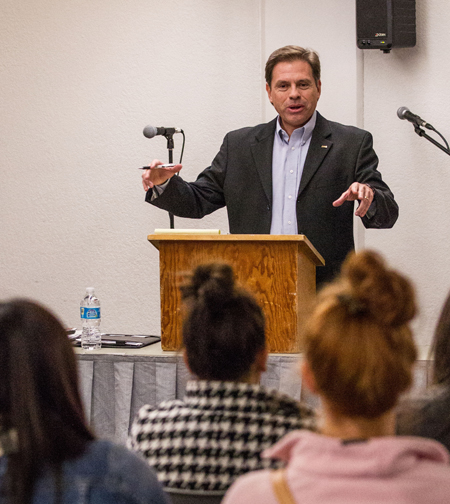
UMB money manager Peter Braun takes questions from the audience during a presentation on Thursday, Nov. 29. (Photo by ANDRE MATHER, Photo Editor)
Story by Nicole Cooke, Copy Editor—
Communication students had the opportunity to hear from a money manager from UMB speak on financial issues related to students Thursday, Nov. 29.
Senior Vice President Peter Braun spoke to professor Carol Atkinson’s law and media class, along with other communication students, and made his presentation audience-oriented.
He began his presentation by taking questions from students in the room, instead of giving a prepared speech.
Students asked a wide range of questions, ranging from the fiscal cliff, gas prices, issues in Europe — specifically Greece, the housing market and student loans.
More than 10 topics were offered for discussion, which would’ve prompted a much longer discussion than planned.
“Dr. Atkinson, I think we’ll be here for about the next eight hours,” Braun joked.
Braun decided to talk about topics that encompassed many of the questions asked, and to give a brief history on the current economic state of the U.S. to help students understand some of the problems that are occurring today.
He started by saying that it’s more difficult to manage money now, and that is mostly caused by the Internet.
“Media has a tremendous impact on us, much bigger than it did 15 or 20 years ago,” Braun said. “There is 24/7 accessibility to information now.
Back then, a currency situation in a foreign country wouldn’t make the first 10 pages of a paper and you wouldn’t hear about it for days.
Now, it affects the financial market here. It makes headlines.”
Braun told students a story about when tulip bulbs were introduced in the Netherlands – a story of supply and demand that created the first recorded bubble.
They were such a rare commodity that they would sell for thousands of dollars and were seen as a sign of wealth. Once the demand went down, the price went down as well.
Then came the bubbles of the current century. There was the computer bubble surrounding Y2K, and then the housing bubble from a few years ago.
Having two bubbles in one decade was a first for the U.S., Braun said.
The U.S. economy is on the rise though. The Dow went from about 6,500 to about 13,000 in just four years.
Braun said that in times like these, countries have to help out other countries to make sure their trading partners are healthy, such as helping China so an economic crisis there wouldn’t affect the U.S.
The last topic he covered was the upcoming fiscal cliff. He said to think of the cliff as how to resolve taxes and spending.
“Congress will be deciding if they will keep or get rid of the Bush tax cuts,” Braun said. “It will have some kind of impact on everyone. Raising taxes and cutting spending is a wonderful recipe for a recession.”


Leave a Reply